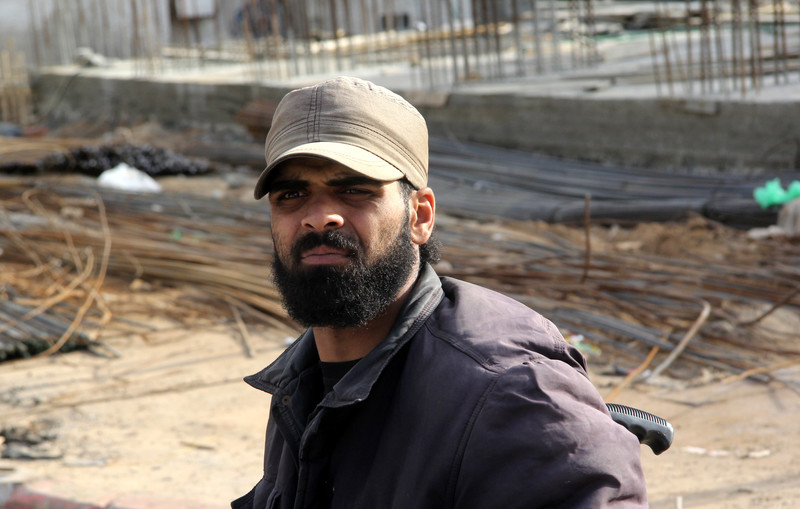How should I mourn the death of somebody who – like so many others – has been killed simply for being Palestinian? Ibrahim Abu Thurayya was shot dead by Israel….

How should I mourn the death of somebody who – like so many others – has been killed simply for being Palestinian?
Ibrahim Abu Thurayya was shot dead by Israel along Gaza’s boundary with Israel last Friday.
My thoughts and feelings on his killing are complex and cannot fully be expressed in words.
Abu Thurayya was actually one of four people killed by Israel on the same day. These killings took place amid protests against Donald Trump’s decision to recognize Jerusalem as Israel’s capital.
Yet because both of his legs had previously been amputated, the local and international media paid more attention to Abu Thurayya’s story than they do to the experiences of most Palestinian victims.
Many articles on his killing highlighted how Abu Thurraya posed no threat to the Israeli military.
Palestinians killed by Israel usually don’t pose any real threat to that state’s heavily armed forces. Yet the question about whether he posed a threat shouldn’t even arise.
The very question ignores the power dynamics between a soldier serving an occupying power and civilians who have spent their entire lives under occupation. Asking a question about whether a Palestinian poses a threat is a subtle way of putting the blame on the victims.
I have no wish to tell a story of a 29-year-old whose disability did not make him immune to Israel’s lethal weapons. We have lost so many people that our wounds have never healed. Another killing deepens the pain felt in our open wounds.
Dehumanization
I know too well the level of dehumanization to which Israel subjects us.
Israel and its supporters openly describe us as a “demographic threat.” Our history and identity, indeed our very existence as a people threaten to destroy all the myths that Israel has propagated in its desperate search for “international legitimacy.”
I know too well that being a Palestinian is enough reason for Israel to kill us.
Why should the specific tragedy of Ibrahim Abu Thurayya suddenly awaken people to Israel’s brutality against Palestinians? There are thousands of other striking examples – children being killed, beaten up (sometimes in front of cameras) and terrorized in Israeli jails – that only received a fraction of the attention being paid in this case.
It troubles me that we seem to have more sympathy for Abu Thurayya than we do for other victims.
Abu Thurayya had to have both his legs amputated after being attacked by Israel in April 2008.
Seven others were killed in that attack. It took place during an Israeli invasion of al-Bureij refugee camp in Gaza.
Would we have felt less sympathy for Abu Thurayya if he had been killed in that attack? If so, why? It would have been the same victim, the same family devastated by losing a loved one.
Ibrahim Abu Thurayya was much more than a man who lost both his legs. He emphasized that much himself.
Abu Thurayya kept on working after he was attacked. He washed cars for a living and once said: “Please never look at my disabled body. Look at the great job I am doing.”
Losing his legs, he added, was “not the end of the world and life should go on.”
Positive attitude
Abu Thurayya refused to be imprisoned by his disability. He also tried to live as freely as he could within the open-air prison of Gaza.
With his positive attitude, he provided an extraordinary example of dignity and resistance.
Since April 2008, Abu Thurayya had been featured in many news stories. He said a similar thing in each of them: “I challenge my disability, I challenge Israel as well.”
In his own way, Abu Thurayya had won a victory over Israel’s attempts to dehumanize Palestinians.
His story would require a book to do it justice – it is a story that must be placed within the collective Palestinian experience of Israeli colonialism. Yet there are some key components of that story which we must not forget.
He was born a third-generation refugee in Gaza’s Beach refugee camp. As a teenager, he worked as a fisherman. Every day he would venture out in a humble boat in waters patrolled by the Israeli Navy – a force that often uses brutal methods to prevent Gaza’s fishermen from plying their trade.
Abu Thurayya was just 20 when he had to have his legs amputated. He continued defying Israel until the end.
The final instance of his defiance came last Friday. Abu Thurayya confronted his oppressor at a protest. An Israeli soldier on the other side of the fence fired at him, piercing his head with a bullet.
Abu Thurayya reminds me of Nadia, a character in Letter from Gaza, a short story which Ghassan Kanafani wrote in 1956.
Nadia was aged 13 when she lost a leg when Israel carried out massacres in Gaza that year. She had been wounded while trying to shield her siblings from Israel’s bombs.
In that story, Kanafani implores that a friend living in California return to Gaza so that he can “learn from Nadia’s leg, amputated from the top of the thigh, what life is and what existence is worth.”
Shortly before he was killed, Ibrahim Abu Thurayya was filmed, saying: “This is our land and we will not give up.”
We can all learn about life from his story. That is why it must be shared, taught and remembered.
